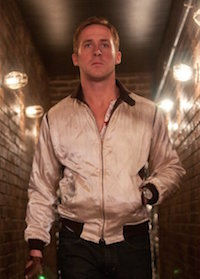It's Chris Feil's weekly column on music in the movies! This week is the techno mythmaking of Drive:
 So there’s a new musically-infused motorist crime tale on the block? While Baby Driver tries to take space on your headphones, it may still have to take a backseat to something even more moodily effective (if less uplifting): Nicolas Winding Refn’s Drive.
So there’s a new musically-infused motorist crime tale on the block? While Baby Driver tries to take space on your headphones, it may still have to take a backseat to something even more moodily effective (if less uplifting): Nicolas Winding Refn’s Drive.
Refn is no stranger to using music (mostly in original scores from frequent collaborator Cliff Martinez) to help build his films’ elusive auras, but he has never been so successful as using this tool as he is here. This film’s musical identity is inextricably linked to the protagonist in ways that inform the audience of his psychosis as much as the subtlety of Ryan Gosling’s performance. Just as Gosling pulls us into the mind of a lovable psychopath, the song choices help make this grim pulp landscape something beautiful.
Kavinsky’s “Nightcall” is an appropriate overture of sorts, grooving to a naked sense of danger while hinting at the mythos the film aims to build around its stoic Driver. In this opening track, Refn is also preparing us for a dark fantasy of a very specific Los Angeles both swoony and terrifying.
That fusion of brooding violence and Euro-chill groove helps build the film’s grungy-electric aesthetic while playing up the dualities of Gosling’s largely speechless driver. When he doesn’t speak for himself, the song cues embody his depth of feeling and his brewing aggression. It’s a lurid, dangerously sexy, and effortlessly cool musical assemblage, much like the hero himself.
“Under Your Spell” by Desire captures the Driver and Irene (Carey Mulligan) at the growing intrigue of their flirtations, the song thumping like their quickening heartbeats that they don’t exactly acknowledge. “Spell” is quite the perfect word choice for what’s taking place onscreen, both for the hazy glow of budding romance and the film’s hypnotic pull. But underneath the vibe, the lyrics hint at the kind of obsessiveness buried within Gosling’s psychosis that ultimately makes him a ruthless avenger. Love and brutality are sourced from the same part of his brain.
What is it about the music in this film that feels integral to the experience and not tacked on or performative? There’s a cohesiveness to how the techno beats seamlessly ebb and flow into Martinez’s score, much like how the visuals pulse from gorgeous to seedy with ease. As his compassion and compulsive punishment become equal influencers, the soundscape becomes elegiac to the grandiosity of his violence with “Oh My Love”. The beautiful and perverse are one and the same - can we even tell where his motivations end or begin in the film’s third act?
But this electronic vastness also serves to build a mythos around the Driver. Like the subtle ticks in Gosling’s facade, there is a warmth beneath the performative coldness that’s both strange and hard to pinpoint. We understand him (for better or worse) while he remains unknowable, the music sweeping and still rather placid as it elevates him to the some monolithic vigilante. After his swift justice, it's the final feeling of serenity that we remember him for before he leaves. And the film ends on a glorious musical note.
Ultimately, College and Electric Youth's “A Real Hero” becomes his definitive anthem in its ethereal, optimistic conviction - the words paint him so clearly, but you can’t quite place the hero it describes. Somewhere inside there is a real humanity, something actually heroic, but he remains a bit of a ghost. A hero escaping in the night.
Previously on Soundtracking:
Big Little Lies
The Adventures of Priscilla, Queen of the Desert
Best Worst Thing...
Sister Act
American Honey